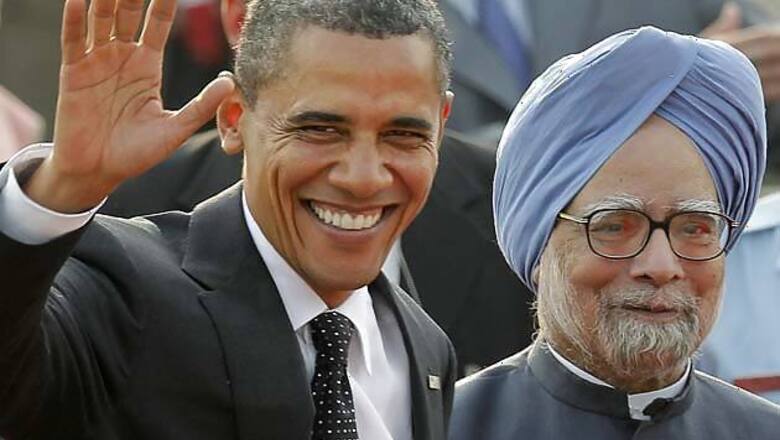
views
Washington: Two days after twin terror attacks in Jammu and an infiltration bid which was foiled by Army in Kupwara, Pakistan was in sharp focus at the Manmohan Singh-Barack Obama summit in Washington on Friday with the Prime Minister telling the US President of the difficulties in dealing with its neighbour as terrorists 'still remained focused in Pakistan'.
Issuing a statement after the meeting, Manmohan Singh said, "I explained to Obama the difficulties that we face given the fact that the epicentre of terrorism remains focused in Pakistan. I look forward to meeting with Sharif even though expectations have toned down given the terror arm which is still active in the subcontinent."
Meanwhile, Obama has promised to take up with Nawaz Sharif in a "frank" manner the issue of continued Pakistan-based terror directed against India. The promise was conveyed to Singh during their summit meeting when the Prime Minister referred to the attacks in Jammu and highlighted how terror emanating from Pakistan impacts India "every waking hour" day in and day out, according to sources.
The US side shared India's deep concern over the threat posed by Lashkar-e-Taiba (LeT) to India as well as the region and the world after Singh told him that the terror outfit along with Jamaat-ud-Dawa (JuD) gets "handsome financial support" from the government of Punjab in Pakistan, sources said.
Singh and Obama, who held discussions for about three hours, talked about terrorism in the context of the situation in Afghanistan, with the US President saying that the "major wild card" in this regard is Pakistan.
Both the leaders felt the need for enhancing cooperation against terrorism. The US side wanted to know in what aspects the cooperation between India and the US could be further strengthened, the sources said.
Obama expressed deepest sympathies for the loss of life in the twin attacks in Jammu by terrorists on an Army camp and a police station in Samba. Ten people, including a lieutenant colonel, were killed in the attacks.
The US President appreciated Singh's wisdom in the context of taking forward the dialogue process with Pakistan, the sources said. Singh said India faces difficult challenges and that the safe havens and terror sanctuaries in Pakistan needed to be dealt with effectively not only for security but also for the prospect of progress of the dialogue.
Meanwhile, as part of their effort to enhance defence engagements, India and the US have agreed to identify areas of cooperative and collaborative projects in advance defence technologies and systems in the next one year.
Applauding bilateral defence cooperation and expressing satisfaction with the progress achieved to date in defence relations, Manmohan Singh and Obama in a joint statement on Friday emphasised the need for more intensive defence cooperation on both sides.
The two leaders endorsed a Joint Declaration on Defence Cooperation as a means of enhancing their partnership in defence technology transfer, research, co-development and co-production.
"The two sides look forward to the identification of specific opportunities for cooperative and collaborative projects in advanced defence technologies and systems, within the next year," the Joint Declaration on Defence Cooperation said.
Obama welcomed India's decision to participate in the Rim of the Pacific (RIMPAC) naval exercise hosted by US Pacific Command in 2014. The two leaders, in the spirit of their continuing non-proliferation cooperation, reviewed the close cooperation of the US-India to realise New Delhi's intention of joining the multilateral export control regimes.
Obama also reaffirmed the US support for India's early membership in these groups, the declaration said.
Looking ahead to the 2014 Nuclear Security Summit in The Hague, the two nations will seek to deepen their cooperation through the 2010 Memorandum of Understanding with India's Global Centre for Nuclear Energy Partnership, to strengthen global nuclear security.
The two leaders also called for expanding security cooperation between the India and the US to address 21st century challenges in the areas of counter-terrorism, cyber, space, and global health security.
With Additional Inputs From PTI




















Comments
0 comment